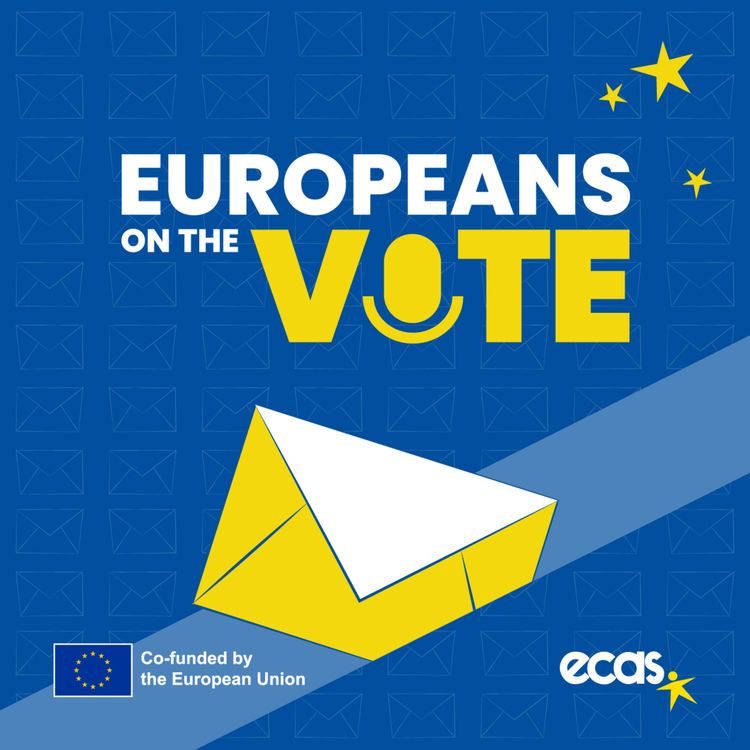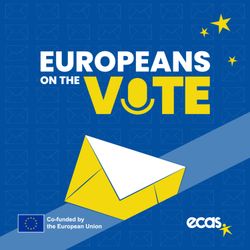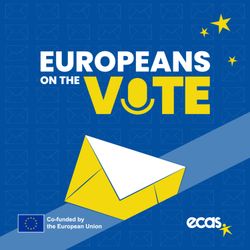Share

Europeans on the Vote
Accessible Elections
Ep. 3
•
Five years ago, in 2019, in the last European Parliament Elections, 400,000 voters with disabilities across the Union were deprived of their right to vote. Five years later, how do things stand?
In this third episode, ECAS Communications Manager Marta Azevedo Silva sits with Alejandro Moledo from the European Disability Forum to discuss good practices and current obstacles to accessible elections.
For more information about this project, visit our website: https://ecas.org/projects/ecas-podcast/
This podcast is produced with the support of the European Commission's Citizens, Equality, Rights and Values (CERV) programme.
More episodes
View all episodes

6. Imagining a European Elections Dystopia
18:32||Ep. 6Crowdsourcing is a way of solving problems and producing new ideas by allowing citizens to collaborate and participate in decision-making.In this podcast episode, our colleagues Elisa Lironi and Savannah Schuurbiers presented the ECAS crowdsourcing methodology and our latest activity, in which citizens imagined a dystopia for the 2024 European Parliament elections.Visit our crowdsourcing platform: https://crowdsourcing.ecas.org
5. Empowering youth engagement in policy-making
22:15||Ep. 5In this episode, ECAS Communications Manager Marta Azevedo Silva sits down with Aurel Laurenţiu Plosceanu, Vice-President of the Economic and Social Committee, to discuss effective strategies to empower young people in exercising their political rights and encouraging them to get more involved in different levels of EU democratic processes.For more information about this project, visit our website: https://ecas.org/projects/ecas-podcast/This podcast is produced with the support of the European Commission's Citizens, Equality, Rights and Values (CERV) programme.
4. Adapting citizens' engagement to new realities
12:35||Ep. 4In this fourth episode of the “Europeans on the Vote” podcast series, ECAS’s EU Rights Manager Claire Morot-Sir interviews Political and Data scientist Havva Ebrahimani Pour, who works at the VUB University in Brussels. Specialised in digital inclusion and citizen engagement studies, Havva provides insightful solutions to engage citizens in the political process and foster a stronger and more inclusive political participation at the EU level.For more information about this project, visit our website: https://ecas.org/projects/ecas-podcast/This podcast is produced with the support of the European Commission's Citizens, Equality, Rights and Values (CERV) programme.
2. The journey of a politically active EU mobile citizen
22:30||Ep. 2In this second episode, ECAS’ EU Rights Manager Claire Morot-Sir interviews Bertrand Wert, a French citizen who chose to run as a candidate in a Belgian municipality. However, he originally comes from another EU Member State. Are EU mobile citizens aware of their right to vote and stand as candidates in municipal and European elections? Bertrand explains what remains to be done to raise awareness of EU political rights and encourage all EU mobile citizens to participate in the political landscape of the country where they reside.For more information about this project, visit our website: https://ecas.org/projects/ecas-podcast/ This podcast is produced with the support of the European Commission's Citizens, Equality, Rights and Values (CERV) programme.
1. The Future of Digital Democracy
28:56||Ep. 1In this first episode, ECAS Communications Manager Marta Azevedo Silva sits down with Dr. Giovanni Allegretti and Dr. Gianluca Sgueo to explore the advantages and challenges of digital democracy. Does digital democracy have a promising future? Or rather, a dystopian one? Our experts delve into this and reflect on how digital technology has and will impact democracy.For more information about this project, visit our website: https://ecas.org/projects/ecas-podcast/This podcast is produced with the support of the European Commission's Citizens, Equality, Rights and Values (CERV) programme.